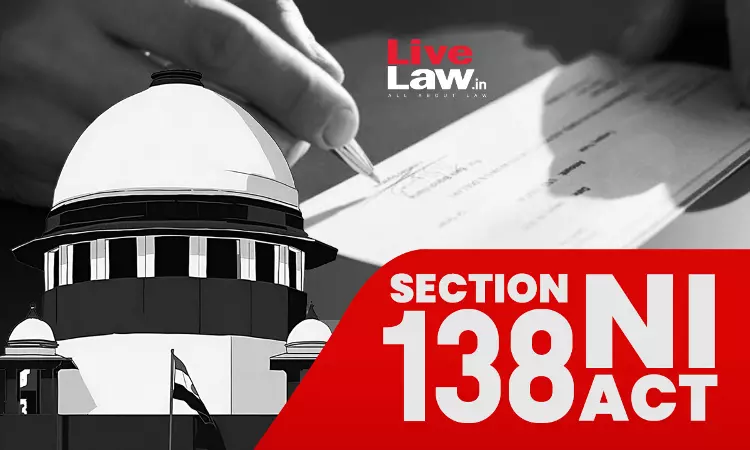- Home
- /
- Supreme court
- /
- S. 138 NI Act | Complainant Has No...
S. 138 NI Act | Complainant Has No Onus To Prove Financial Capacity At The Threshold : Supreme Court
Yash Mittal
3 April 2025 1:11 PM IST
The Supreme Court reaffirmed that once the drawer admits to signing the cheque, the presumption under Section 139 of the Negotiable Instruments Act, 1881 (“NI Act”) cannot be rebutted merely by questioning the complainant's debt-giving capacity, especially when such a defence was not raised in the reply notice by the accused.“The onus is not on the complainant at the threshold to prove...
The Supreme Court reaffirmed that once the drawer admits to signing the cheque, the presumption under Section 139 of the Negotiable Instruments Act, 1881 (“NI Act”) cannot be rebutted merely by questioning the complainant's debt-giving capacity, especially when such a defence was not raised in the reply notice by the accused.
“The onus is not on the complainant at the threshold to prove his capacity/financial wherewithal to make the payment in discharge of which the cheque is alleged to have been issued in his favour. Only if an objection is raised that the complainant was not in a financial position to pay the amount so claimed by him to have been given as a loan to the accused, only then the complainant would have to bring before the Court cogent material to indicate that he had the financial capacity and had actually advanced the amount in question by way of loan.”, the court observed.
The bench comprising Justices Sudhanshu Dhulia and Ahsanuddin Amanullah heard the case where the Appellant/complainant challenged the Allahabad High Court's decision which had overturned the trial court's order convicting the Respondent/accused for an offence of cheque dishonor punishable under Section 138 NI Act.
In this case, the Appellant alleged that he had disbursed a loan of ₹22 lakhs to the accused. The cheque issued by the Respondent for debt repayment was dishonoured by the bank with the remark "payment stopped by drawer."
The Appellant argued that the cheque was genuine, presented within time and upon it being dishonoured, due notice was sent within 30 days of such dishonour, to which re-payment must be received within 15 days, failing which a complaint was filed under Section 138 NI Act.
It is important to note that no reply was given by the accused to the notice sent by the complainant before initiating proceedings under the NI Act.
Challenging the High Court's decision, the Appellant approached the Supreme Court.
Overturning the High Court's decision, the judgment authored by Justice Amanullah upheld the Appellant's stance that the burden of proving his debt-paying capacity could not be shifted onto him at the outset. The Court emphasized that this burden remains with the accused, who failed to rebut the presumption of a legally enforceable debt and did not respond to the notice to present evidence that the complainant lacked the financial capacity to grant the loan.
In this regard, reference can be drawn to the recent case of Tedhi Singh vs Narayan Dass Mahant, (2022) 6 SCC 735 where it was held:
“in the case under Section 138 of the NI Act the complainant need not show in the first instance that he had the capacity. The proceedings under Section 138 of the NI Act is not a civil suit. At the time, when the complainant gives his evidence, unless a case is set up in the reply notice to the statutory notice sent, that the complainant did not have the wherewithal, it cannot be expected of the complainant to initially lead evidence to show that he had the financial capacity.”
“In the present case, on an overall circumspection of the entire facts and circumstances of the case, we find that the appellant succeeded in establishing his case and the Orders passed by the Trial Court and the Appellate Court did not warrant any interference. The High Court erred in overturning the concurrent findings of guilt and consequential conviction by the Trial Court and the Appellate Court.”, the court noted.
In terms of the aforesaid, the court allowed the appeal restoring the Trial Court's conviction but modifying the sentence to only a fine of ₹32 lakhs (payable within 4 months, else original sentence applies).
Case Title: ASHOK SINGH Vs. STATE OF UTTAR PRADESH & ANR.
Citation : 2025 LiveLaw (SC) 383
Click here to read/download the judgment
Appearance:
For Appellant(s) Mr. Pinaki Addy, Adv. Ms. Arpita Singh, Adv. Mr. Chandrakant Sukumar Sarkar, Adv. Mr. C M Dwivedi, Adv. M/S. Mukesh Kumar Singh And Co., AOR
For Respondent(s) Mr. Shadan Farasat, Sr. Adv. Mr. Ashish Kumar Pandey, Adv. Mr. Harshit Anand, Adv. Mr. Vedant Sharma, Adv. Mr. Shadab Azhar, Adv. Mr. Mayank Pandey, AOR



